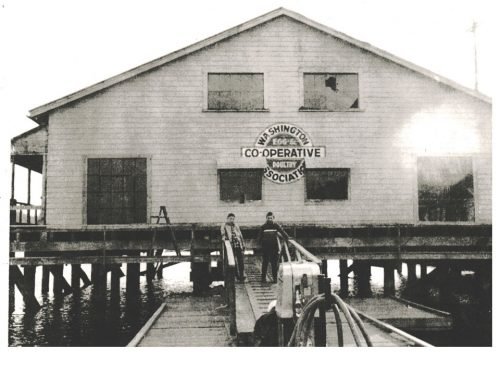Lisa Bryan and Ted Olinger, KP News
 The pier warehouse was converted to a marina in 1958 but retained the local co-op logo until at least 1963. Photo courtesy: Mark Scott
The pier warehouse was converted to a marina in 1958 but retained the local co-op logo until at least 1963. Photo courtesy: Mark Scott
Lakebay Marina, once known as the Washington Cooperative Egg and Poultry Association Lakebay Station, was officially placed on the Pierce County Register of Historic Places by unanimous vote of the Pierce County Council Feb. 12.
“From this point forward, the owners are eligible to apply for preservation grants, whether that is a building or structural type grant or a program such as a federal tax credit,” said Chad Williams, a planner in the Pierce County Planning and Land Use Department who oversees Pierce County’s Historic Preservation Program.
“Sometimes folks think this means we’re going to roll a wheelbarrow of money out there, but that’s far from the truth,” he said. “Applications are reviewed, hopefully for structural rehabilitation as opposed to, say, adding a sign. Nothing is automatic in that process and everything must still be to code.”
“We’re pleased and moving forward,” said Catherine Williams, the new president of the Key Peninsula Historical Society (no relation to Chad Williams). She helped research and finalize the application to the county landmarks commission with Lakebay Marina owner Mark Scott.
“Mark approached me at the museum and asked if I would be willing to work on it with him,” Williams said. Brian McBeth, a graduate student earning his master’s degree at the University of Oregon, had already prepared an earlier application, and she built on his work. “I talked to Chad Williams at Pierce County and he suggested focusing on the co-op, because there wasn’t much information on that and they already had a lot of information on the Mosquito Fleet.”
Farmers on the Key Peninsula joined the Washington Co-Operative Egg and Poultry Association in 1928 and built a warehouse at the end of the pier, now home to the Lakebay Marina.
The original pier in Mayo Cove was built in 1884 by Carl Lorenz for his own use. He ran a mill on Bay Lake and built boats to take the milled wood to market. Lakebay steamboats hauled passengers, produce, livestock, merchandise and mail for the next 74 years.
“The co-op offered people, particularly during the Depression, the chance to turn themselves into chicken farmers,” Williams said. “Chickens were cheap to raise and to keep, and you could take your eggs there to swap for gas, tires, tractor parts, or get cash.”
“The eggs were called cackleberries,” Williams said. “They had so much fruit out here; huckleberries and raspberries, so why not?”
“Sometimes folks think this means we’re going to roll a wheelbarrow of money out there, but that’s far from the truth.”
The co-op shipped an average of 150 cases of eggs a week, each containing 18 dozen, according to Williams. That worked out to 7,800 cases annually or 1,684,800 eggs a year.
“They had special rail cars that were refrigerated; we shipped those eggs from this peninsula clear back to the East Coast,” she said. “They liked ours better; they were fresh, they liked the way they were packed, and they were pretty. We used mostly Leghorn hens that gave a big, white egg.”
There was also a social aspect to co-op membership.
“It was a big social part of the Key Peninsula at the time, particularly in the ’30s, bringing people together,” Williams said. “The roads were pretty much dirt roads and muddy at best; the water was how people got around.”
There were approximately 370 members in the co-op at a time when there were only about 1,300 people on the peninsula. “I was astounded,” Williams said. “Only one member of the family was a member; that means almost every family on the peninsula was involved in the co-op.”
Joyce Olson of Vaughn is one of the few people left on the KP who worked with the co-op. “As a 14-year-old she drove her father’s farm truck with thousands of eggs in the back down the hill to the marina, double-clutching all the way and trying not to run off the road or hit anybody, or break any eggs,” Williams said. “Then she’d drive out on the pier, turn around and back up with men waving their arms all around, and then they’d load her up with two tons of hay and she’d drive back up that hill home, double-clutching all the way.”
The co-op’s Lakebay station closed when it combined with the Gig Harbor co-op in 1958. The warehouse was converted to a marina. Mark Scott became its third owner in 2013.
In an email to KP News, Scott wrote that he “would like to thank Cathy for her help; (she) made it happen (and) the community owes her a thank you.”
Williams is now working with state historian Michael Houser in Olympia to place the marina on the Washington Heritage Registry, which could mean state money for historical restoration.
UNDERWRITTEN BY THE FUND FOR NONPROFIT NEWS (NEWSMATCH) AT THE MIAMI FOUNDATION, THE ANGEL GUILD, ADVERTISERS, DONORS AND PEOPLE WHO SUPPORT INDEPENDENT, NONPROFIT LOCAL NEWS